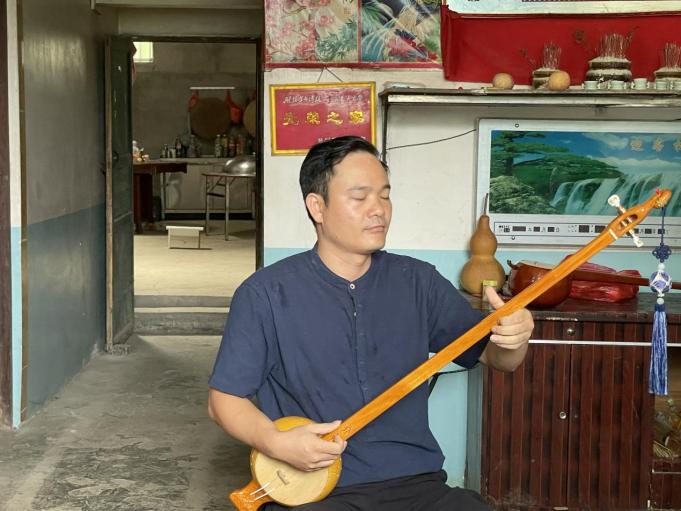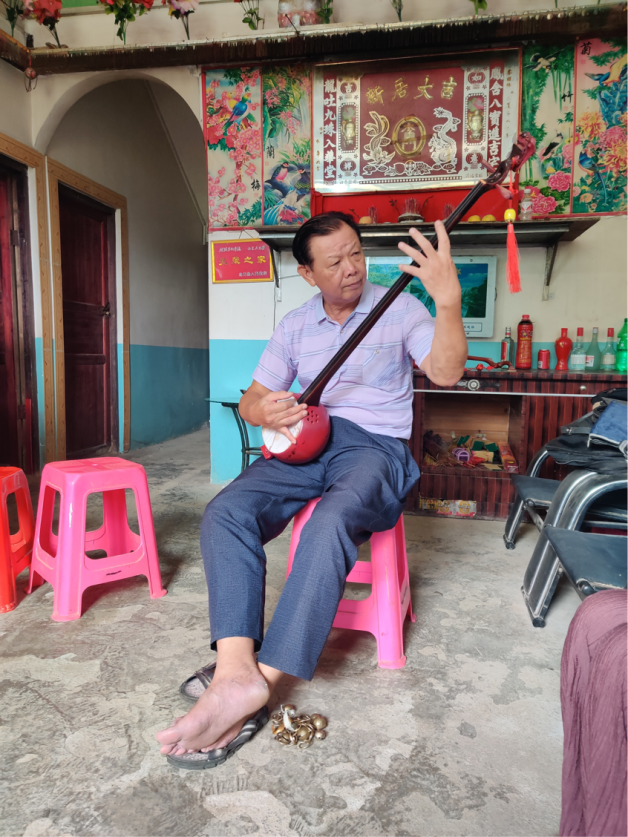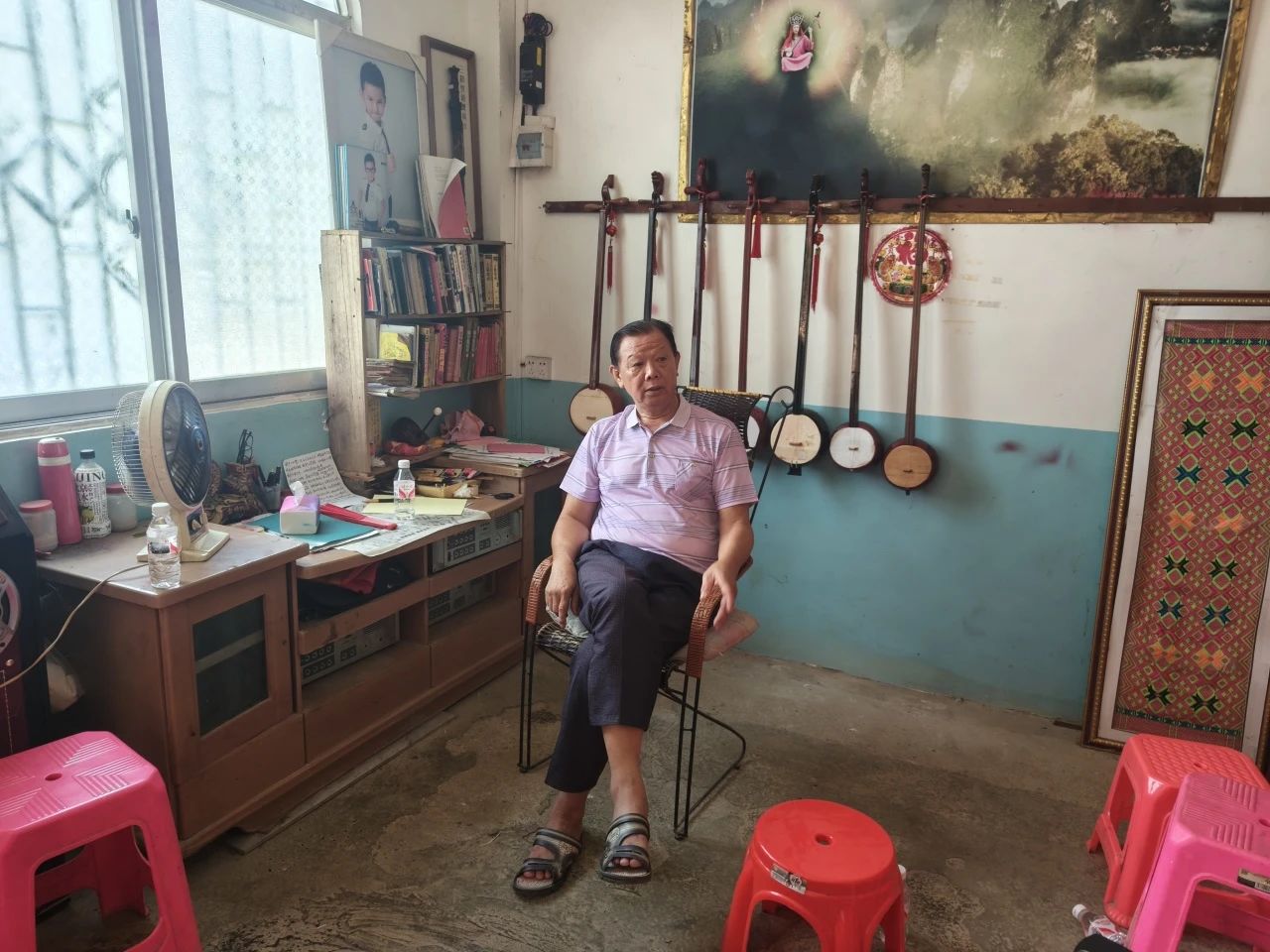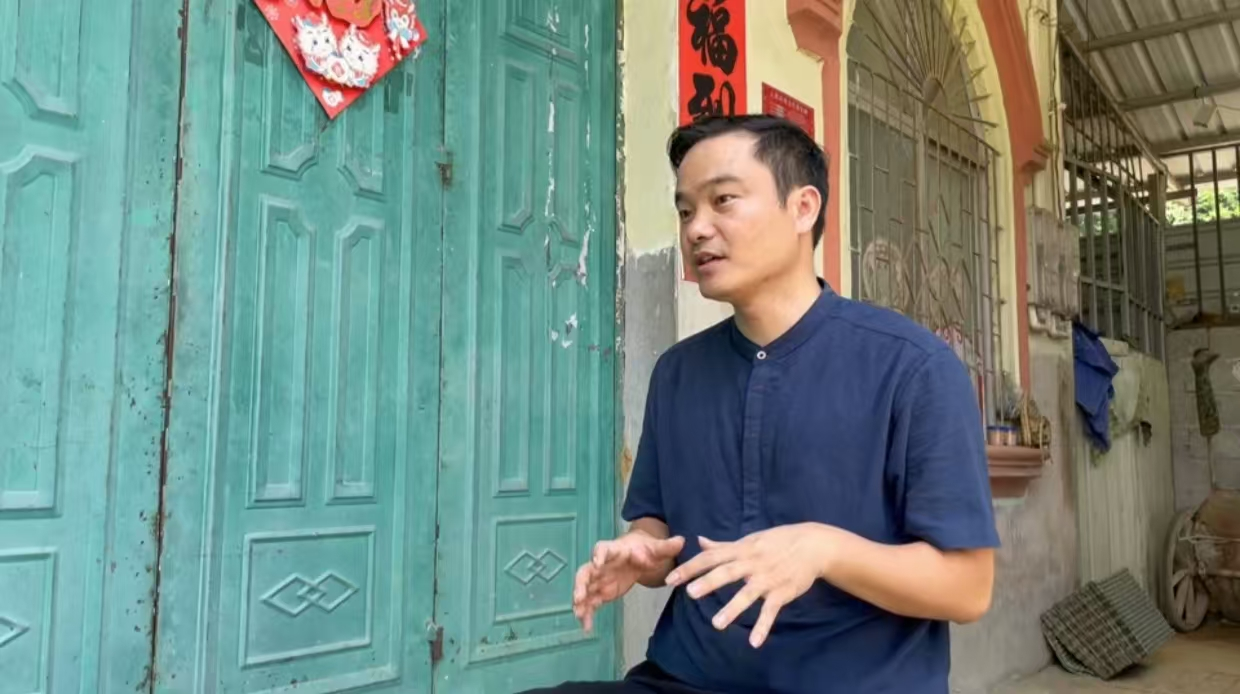NANNING, Aug. 30 (Xinhua) -- Amidst a gathering of visitors in a serene countryside home, Zhu Zhongheng strummed his two-stringed Tianqin Zither, enchanting everyone with the melodic rhythm of his self-composed song.

Zhu Zhongheng plays the Tianqin
As the composition reached its most intense peak, his mentor, Li Shaowei, seated beside him, hooked a cluster of horse bells to his bare toe and tapped them in rhythm.
The 68-year-old Li, a state-recognized 10th-generation inheritor of the Tianqin -- a traditional musical instrument of China's Zhuang ethnic group -- is deeply versed in its orthodox playing rituals and techniques. Zhu, 37, who has studied under Li since 2015, is dedicated to preserving and innovating this ancient art form as a younger-generation inheritor.

Li Shaowei plays the Tianqin
Zhu's efforts exemplify a bold exploration into how to make an ancient, lesser-known art form more accessible to modern audiences while preserving its authenticity.
Mainly practiced in Chongzuo City in Guangxi Zhuang Autonomous Region along the China-Vietnam border, the Tianqin, or "heavenly zither," is cherished by locals who call it "ding" because of its jingling sound. Traditionally played in religious rituals, the Tianqin's melodies, which mimic swallows flying, horses racing, and streams trickling, reflect the Zhuang people's deep love and reverence for nature.

Li Shaowei and his Tianqins
Zhu, hailing from Zhanjiang City in neighboring Guangdong Province, discovered the instrument by chance during a live performance he attended in Guangxi when he was around 20 years old.
"The unique performance techniques and craftsmanship of the Tianqin left me spellbound," he recalled, noting that his desire to learn the instrument was fueled by its potential to produce a diverse range of melodies.
Drawing on his musical background -- nurtured through experiences of playing drums since three and playing guitar as an adolescent -- Zhu taught himself to play the Tianqin while also learning its traditional techniques from Li.
Born into a family that teaches Kung Fu lion dancing and is dedicated to preserving traditional culture, Zhu felt it was a pity that the Tianqin was known to only a few young people and practiced even less.
However, this is no longer the case now. Thanks to the efforts of artisans and performers like Zhu, the Tianqin is experiencing a renewed resonance, fueled by a resurgence of enthusiasm among the Chinese people for their traditional cultural treasures. The Tianqin art form was included in the national-level intangible cultural heritage list in 2021.
"To preserve the Tianqin culture, you have to first make sure there are people willing to learn and practice the instrument," Zhu said. "I hope that Tianqin could be played like a guitar or ukulele."
Zhu's innovative spirit is evident in his enrichment of Tianqin playing techniques, which he describes as "an integration of multiple styles" -- including rock and roll -- aimed at making the instrument more acceptable among modern audiences.
He was upfront about his desire to highlight his exceptional Tianqin technique. "I purposefully flaunted my skills," he admitted, "because if it captured the audience's admiration as 'cool,' then I've succeeded in popularizing the instrument."

Zhu Zhongheng tells his stories
Zhu is also a founding member of a local pop music band that incorporates two Tianqin instruments in place of guitars. He is not concerned that modern adaptations of Tianqin styles might mislead enthusiasts. "Once people are captivated by the instrument," Zhu believes, "they will be inspired to explore its origins and traditional techniques."
Zhu very well understands that to elevate the accompaniment instrument into a versatile solo piece for diverse musical genres, adapting the Tianqin for contemporary stage performances was essential.
Crafting the Tianqin is a meticulous process. Under Li Shaowei's guidance, Zhu mastered the traditional 18-step technique for producing the instrument. When it comes to Tianqin crafting, Zhu has adopted a conservative approach.
In the idyllic countryside of Longzhou County in Chongzuo, Li's home served as a workshop where he taught Zhu the art of handcrafting Tianqin.
Zhu cultivates his own gourds, purchases them from local farmers and even sources them online. To maintain the Tianqin's authenticity, the gourds used for the instrument's sound box must be locally harvested, he explained, noting that thin-skinned local gourds are more likely to produce a crisp sound.
Zhu was officially recognized as an inheritor of the Tianqin crafting technique last year. His impact goes beyond performance and craftsmanship. As a teacher at a local secondary school in Longzhou, he teaches Tianqin to students and music teachers alike. "Seeing young students embrace this instrument is incredibly rewarding," he said.
Speaking about the future of the instrument, Zhu said, "We've nearly overcome all the challenges, from researching its history and refining playing techniques to diversifying its melodies. What remains is the test of time. All I can do is continue teaching and promoting it."
The auther is Xinhua writer Tian Ying. Zhang Qingshuo, Li Weixin, Shi Peng, Zhong Yi, Liu Jie, Guo Bingqian, Feng Shiqi, Wu Xinni also contributed to the story.


 |Hongkou Campus|550 Dalian Road (W), Shanghai 200083, China |Songjiang Campus|1550 Wenxiang Road, Shanghai 201620, China
|Hongkou Campus|550 Dalian Road (W), Shanghai 200083, China |Songjiang Campus|1550 Wenxiang Road, Shanghai 201620, China